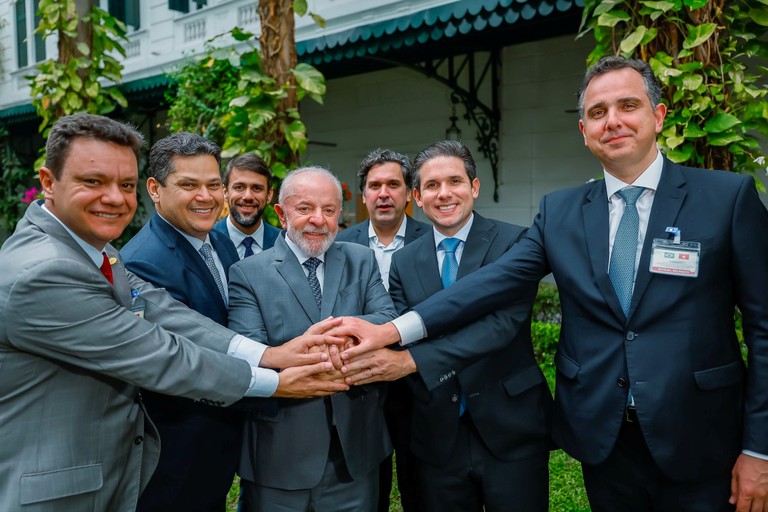Notícias
FOREIGN AFFAIRS
President Lula announces opening of Vietnam's market to Brazilian beef

President Lula, the Presidents of the Chamber (Hugo Motta) and the Senate (Davi Alcolumbre), along with other parliamentarians and members of the Brazilian delegation in Vietnam: the opening of an important market.
After many years of attempts, the prime minister announced that Vietnam will finally buy Brazilian beef for its market. This is extraordinary news, and I believe it is very important for Vietnam, and very important for Brazil’’
Luiz Inácio Lula da Silva
President Luiz Inácio Lula da Silva announced on Friday, March 28, the opening of the Vietnamese market to Brazilian beef. The decision followed a series of meetings with the leaders of the four pillars of the Vietnamese political system: President Luong Cuong; the President of the National Assembly, Tran Thanh Man; the General Secretary of the Communist Party, Tô Lâm; as well as Prime Minister Pham Minh Chính.
"We had a meeting with the president, the president of the National Assembly, the general secretary of the party, but the meeting we had now was with the prime minister. And what brought us joy? After many years of attempts, the prime minister announced that Vietnam will finally buy Brazilian beef for its market. This is extraordinary news, and I believe it is very important for Vietnam, and very important for Brazil," said Lula in a video posted on his social media profile, emphasizing that Brazil had pursued this result for over 20 years.
“I believe that what led to this acceptance was the presence of the President of the Senate (Davi Alcolumbre) and the President of the Chamber (Hugo Motta), which showed the strength of the friendship we want to have with Vietnam," the president added, referring to the heads of the legislative branches who are part of the official Brazilian delegation on the State visit to Vietnam, which also includes ministers, lawmakers, and businesspeople.
Ver essa foto no InstagramUma publicação compartilhada por Luiz Inácio Lula da Silva (@lulaoficial)
ASEAN – Earlier, in an official press statement following the initial meetings and the signing of the Action Plan for the Implementation of the Strategic Partnership with Vietnam for the period from 2025 to 2030, Lula had already commented on the potential not only of selling national animal protein to the Asian country but also of Vietnam becoming a distribution hub for the ASEAN countries, a regional bloc of ten Southeast Asian nations with nearly 700 million inhabitants. "The opening of the Vietnamese market to Brazilian beef will attract investments from Brazilian beef packers to make this country an export platform for Southeast Asia," said Lula.
EMBRAER – In the video posted on social media, Lula also highlighted that the agenda for negotiations with Vietnam include talks to promote Brazilian Company of Aeronautics (Empresa Brasileira de Aeronáutica AS /Embraer)'s regional aircraft in the Asian market. The E190 aircraft, with a capacity of just over 100 passengers, is considered versatile for short, quick trips, making it well suited to the region's geography. "We are also trying to sell some Embraer planes because it is an extremely important aircraft for Vietnam’s regional needs," Lula emphasized.
HISTORY – Seventeen years after Lula’s first visit to Vietnam, bilateral trade has grown significantly. It increased from USD 534 million in 2008 to USD 7.7 billion in 2024, a record in the historical series, with a Brazilian trade surplus of USD 405 million. The joint goal is to reach USD 15 billion by 2030.
TRADE FLOW – Vietnam has become the leading importer of Brazilian products in the Association of Southeast Asian Nations, and was also the 14th largest global supplier of products to Brazil, which exports more to Vietnam than to Portugal, the United Kingdom, France, or Paraguay. Vietnam ranks fifth among the top destinations for Brazilian agribusiness products. Brazil supplies about 70% of the soybeans imported by Vietnam and is the country's leading supplier of pork (around 37%), as well as the second-largest supplier of chicken and cotton.
